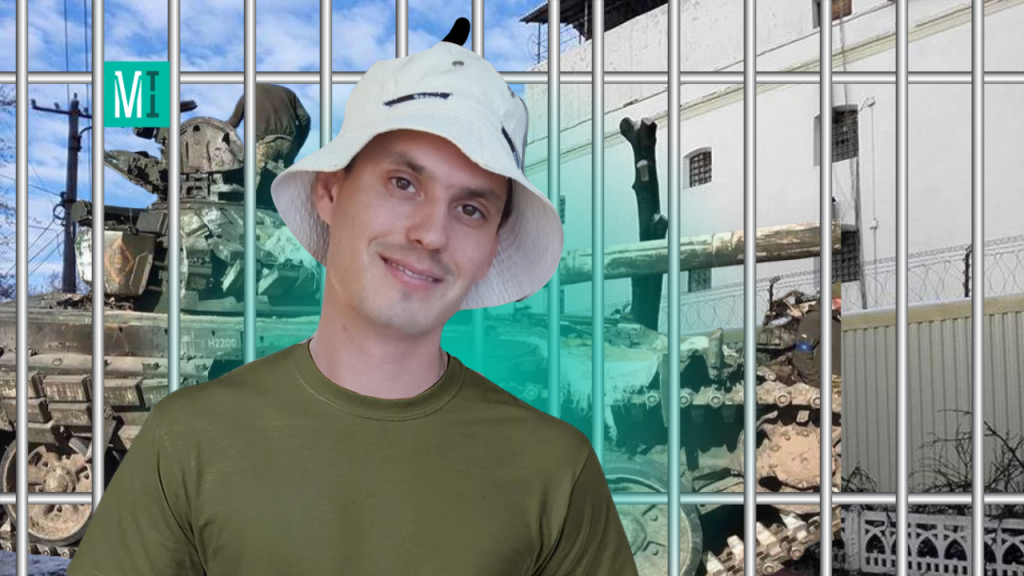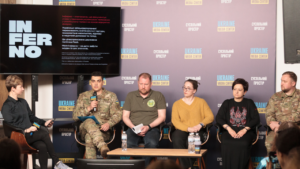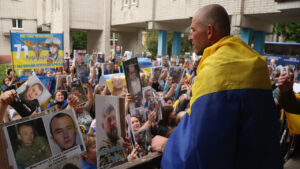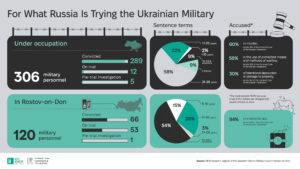Lost in Russian detention centers. How the family of Kherson defender Yehor Kysel is trying to rescue him from captivity

Yehor Kysel, an Anti-Terrorist Operation (ATO) veteran, defended Kherson during the early days of the full-scale invasion. After the city was occupied, he was abducted by Russians. Since then, the man’s place of detention has changed several times. We share what is happening with the veteran based on the account of his sister, Inna.
On a familiar route, Inna Kysel arrived at Temporary Detention Facility No. 1 at 3 Teploenerhetykiv Street in Kherson, where the Russians had held her brother Yehor and his friend Serhii (the name is changed for security reasons). The young woman brought food, which the detention center guards usually agreed to give to the detained men, but not this time.
Inna was informed that her brother was ‘being talked to,’ so she was temporarily prohibited from delivering food. She received the same response over the following two weeks until the officer on duty told her to bring ointments and medications for the detainees. The woman started asking what specific items and for what conditions she should take.
— Just something to heal the wounds and some ointment for burns, — she heard in response.
The guard tried to calm the frightened Inna, assuring her that Yehor and Serhii were fine, alive, and healthy.
— Why are you so anxious? They are just silent like partisans! Once they tell us something, they will be let out. — he finally added.
But the men were never released.
Invasion
Before the full-scale invasion, thirty-year-old Yehor Kysel from Kherson worked as a warehouse clerk at a plumbing supply store. He had combat experience — in 2014-15, he participated in military operations in the ATO zone. He was later listed as a reservist in the military operational reserve and attended annual military training.
After the Russians advanced to Kherson on February 24, 2022, Yehor arrived at the local military enlistment office at 9 a.m. in response to the first call. As his sister explains, the territorial defense of the city was being somehow organized there and dispatched in various directions to protect Kherson.
Inna recalls Yehor was put on a bus and driven to the area around Naddnipryanske and Molodizhne villages. His family could not reach him by phone for the next day. On February 26, the men returned home unharmed. By that time, the Russians had already occupied the Antonivskyi Bridge, Russian troops had started entering Kherson, and sabotage activities had intensified in the city.

Yehor Kysel, a prisoner of the Russian Federation, but officially considered missing
On March 1, Russia fully occupied the regional center, and Yehor was well aware of the consequences this would have for him. His sister recounts he stopped arriving home, only appearing a few times to collect his belongings. He did not reveal where he was hiding.
The occupiers searched the Kysel apartment twice, looking for Yehor and weapons. On July 2, 2022, Russian FSB officers came to the apartment. It was 9:30 p.m.
— They silently took the flash drives and a hard disk from the computer and asked about the weapons and Yehor again. — the woman recalls.
Later, it turned out that by that time, the guy had already been detained by the Russians for several hours.
July 2
Yehor Kysel’s friend, Yevhen, was late for a meeting. He had arranged to meet Yehor and Serhii at 7:00 p.m. sharp. As he approached Serhii’s house, Yevhen saw several cars marked with the letter ‘Z’ and didn’t dare to go further. He turned around and headed in the other direction, intending to warn his friends about the Russian vehicles, but it was too late. Inna recounts the details of the guys’ detention based on information from Serhii’s mother:
— Yehor arrived at 7:00 p.m. sharp and went into the garage where he and the guys were supposed to meet.
Meanwhile, Serhii had gone home to get something. As soon as Yehor was in the garage, soldiers in Russian uniforms started climbing over the fence from all sides — armed with rifles, wearing masks, and carrying shields. They subdued Yehor, placed him against the wall, and began searching.
On Serhii’s mother’s account, there were many occupiers — at least ten. Some of them rushed into the house searching for Serhii. After a while, they brought him outside, pulled hats over the guys’ heads, and placed them into a vehicle.
The next day, Serhii’s mother called Yehor’s family to inform them about the detention. However, she did not know where the guys had been taken. The relatives searched everywhere — visiting pre-trial detention centers, Correctional Colony No. 90, and contacting the alleged commandant’s office. Eventually, it was discovered that Yehor and Serhii were held at the Temporary Detention Facility on Teploenerhetykiv Street.
— We approached the guard and mentioned the surname Kysel. We were informed he had been brought in two days ago. — Inna continues.
The young men were held at the Temporary Detention Facility for two months, from July 2 to September 2, 2022.

One of the cells where people were held at the Kherson Temporary Detention Facility, November 14, 2022. Photo: Suspilne
“Frozen”
— He’s not here, — the guard snapped when Inna brought food to the detention facility as usual on September 2.
That’s how the Kysel family learned that Yehor and Serhii had been transferred to Crimea ‘for a trial,’ as the family was told.
The family sent inquiries to the Crimean detention centers and appealed to the occupation courts. However, they received no information about the young men. Eventually, they had a response from the FSB.
— “The person is in conditions that do not pose a threat to life, and measures are underway,” — the woman quotes the letter from the Russian security service.
Later, the guys were mentioned by other detainees who returned to Kherson after their captivity. In November, it was reported that Yehor was classified as “frozen.”
— This term is used for those who are held without charges. They do not officially acknowledge detainees until a criminal case is initiated against them. — Inna explains.
At the end of 2022, another Kherson resident named Roman, who had been detained by the Russians, contacted Kysel’s family. Although he hadn’t seen Yehor himself, he confirmed that Yehor was being held in Simferopol Detention Center No. 1. In February 2023, Yehor’s girlfriend, Anna, received a message from another former prisoner, who wrote that the guys were still in Simferopol but had been transferred to Detention Center No. 2.

Simferopol Detention Center No. 1
Many Ukrainians unlawfully detained in this detention facility are denied the right to a lawyer by the Russians. After the de-occupation of Kherson, the Kysel family appealed to Ukrainian law enforcement agencies — the National Police, the State Bureau of Investigations, the National Information Bureau, and the Coordination Headquarters for the Treatment of Prisoners of War. They were informed that Yehor was listed as missing.
In December 2023 and then in January 2024, the family was contacted by a woman whose husband was in Detention Center No. 2. The Russians had initiated a criminal case against him. He communicated with his wife through his lawyer, informing her that Yehor Kysel was still being held in that detention center.
— All people who contacted us and reported seeing my brother didn’t share a cell with him. However, they knew about his presence there. They said that he was alive. But we don’t know his condition — the interviewee admits to MIHR.
Currently, the Kysel family is seeking ways to bring Yehor home. However, their first priority is to determine his exact location and condition. The family also hopes that once Russia confirms Yehor’s place of detention, they will be allowed to send him packages and letters. As a reminder, according to International Humanitarian Law, Russia is obliged to provide prisoners with correspondence.
Yevheniia Korolova, journalist MIHR







